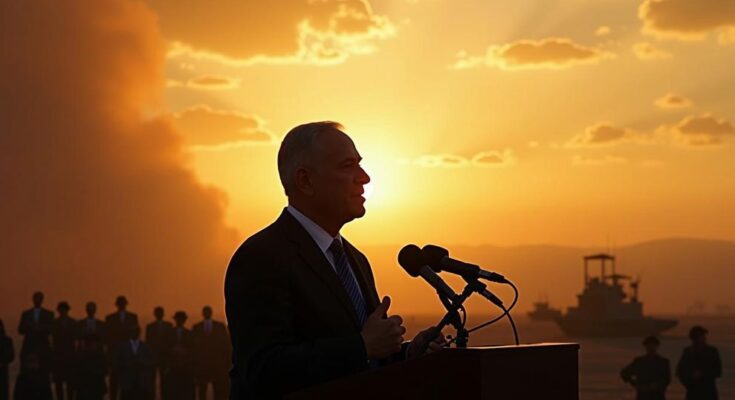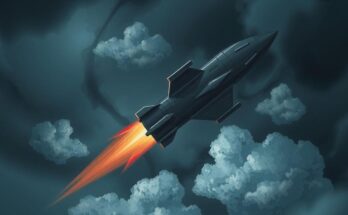Israeli Prime Minister Benjamin Netanyahu declared no immediate ceasefire in the escalating conflict with Hezbollah during a UN address, emphasizing Iran’s influence in the region. Israel’s military actions have led to significant casualties in Lebanon, with ongoing exchanges of fire reported. The long-standing Israel-Gaza conflict continues to be exacerbated, showing critical humanitarian impacts on the Gazan population.
In a compelling address to the United Nations General Assembly, Israeli Prime Minister Benjamin Netanyahu asserted that Israel would maintain its military operations against Hezbollah, dismissing any notions of an immediate ceasefire amid the ongoing conflict in Lebanon. Netanyahu’s remarks underscored the rising tensions, emphasizing that Israel views itself as defending against threats orchestrated by Iran. He proclaimed, “There is no place in Iran that the long arm of Israel cannot reach, and that is true of the entire Middle East.” In recent weeks, Israel has intensified its military actions against Hezbollah, resulting in significant casualties, including over 600 deaths among Lebanese citizens. Amidst escalating hostilities, exchanges of gunfire between the Israel Defense Forces and Hezbollah continued to mount. Furthermore, events in the region have culminated in the recent killing of key Hamas military leaders, heightening the urgency and gravity of the situation. The persistent Israel-Gaza conflict, which has endured over several months, has further complicated the geopolitical landscape. Following a substantial cross-border assault by Hamas on October 7, resulting in approximately 1,200 Israeli fatalities and numerous hostages, Israel declared war in retaliation. The subsequent military response has led to unprecedented humanitarian crises in Gaza. Israel’s military operations have reportedly claimed tens of thousands of lives and triggered severe famine-like conditions for over half of the Gazan population. While the United States continues to support Israel through military assistance and funding, tensions exist between Prime Minister Netanyahu and various U.S. political leaders, including President Biden, especially concerning humanitarian concerns in Gaza. Despite the ongoing strife, the deep historical roots of animosity between Israelis and Palestinians, dating back to the establishment of Israel in 1948, continue to shape the current landscape of conflict in the region.
The Israeli-Palestinian conflict is a long-standing and deeply entrenched dispute that has its origins in historical tensions predating the establishment of the State of Israel. The current escalations stem from ongoing hostilities between Israel and militant groups like Hamas and Hezbollah. The resurgence of violence in Lebanon is part of a broader pattern of conflict characterized by cycles of retaliation, military incursions, and significant humanitarian crises, particularly in Gaza. The international community, including the United States, plays a crucial role in supporting Israel while facing pressures for humanitarian interventions amidst widespread suffering in Palestinian territories.
In summary, Prime Minister Netanyahu’s address at the United Nations reflects Israel’s unwavering stance against Hezbollah and its broader confrontations with Iran, amidst a perilous conflict landscape. The increasing casualties from military operations and the humanitarian fallout in Gaza underscore the urgency of addressing the underlying issues of the Israeli-Palestinian conflict. The international involvement, particularly that of the United States, plays a pivotal role in shaping the dynamics of this ongoing crisis.
Original Source: www.washingtonpost.com




